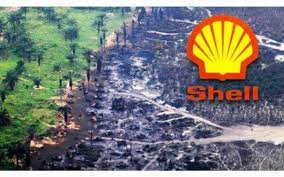By BEN EGUZOZIE
Global oil giant, Shell, which operates in Nigeria under its subsidiary, Shell Petroleum Development Company (SPDC) decision to finally agree to the payment of €15 million (or $16 million) to some Ogoni farmers whose farms were polluted 13 years ago during the company’s oil exploration and production activities, has come with mixed emotions as the all the four farmers who took the global energy giant to court have since died.
A Dutch appeals court had ruled in 2021, following 13 years of legal battles, that Shell’s Nigerian branch must pay out for a series of oil pipeline leaks; and that the parent company must install new pipeline equipment to prevent further devastating spills.

This is the sad part of the outcome of a landmark spill case, in which it took the plaintiffs more than a decade to get justice for destruction of their means of livelihood.
According to Morris Alagoa, popular environmental rights activist and head of Bayelsa field operations of Environmental Rights Action/Friends of the Earth (ERA/FoE) Nigeria, the development underscores the import of the dictum – justice delayed is justice denied.
But Eric Dooh, one of the current plaintiffs, said “it is a great relief to all of us that after the years of legal battle with Shell, we will soon be recipients of this money as compensation for all we have lost.”
Shell said that it had reached a deal with the Dutch environmental group Milieudefensie that has helped the affected communities. The oil giant said “under the settlement, the Shell Petroleum Development Company of Nigeria Ltd (SPDC) as operator of the SPDC joint venture, will pay an amount of EUR 15 million for the benefit of the communities and the individual claimants”.
The deal also confirms the installation of a leak detection system on 20 pipeline segments in accordance with the Dutch court ruling; and that remediation work has been completed.
But the oil giant said its agreement to pay the compensation “is on a no admission of liability basis, and settles all claims and ends all pending litigation related to the spills.”
Shell is not certainly new to long and almost deleterious legal battles with its Nigerian host communities. Like the bush attack dogs, which habitually chase their prey to exhaustion, the oil giant drags its plaintiffs the longest legal stretch. Perhaps to their demise, as is the case with the four Ogoni farmers.
Since 2021, the global oil giant along with its two parent companies in the UK and Hague is still battling to come clean of culpability in an N800 billion compensation bill from spill on swamp farmlands in Egbalor, Ebubu in Eleme Local Government Area of Rivers State, by far the biggest dispute debt award in the Nigerian oil industry.
Lucious Nwosu, the late legal albatross and maverick environmental lawyer, fought and won many legal battles against Shell, the biggest victory being a $110 million (or N45.9 billion) spill payment to Ogoni. But he died without getting his biggest spill compensation payment done with. The $110 million was to end a 30-year tussle by the Ogoni community against the oil giant’s more than half-a-century oil business in Ogoni land.
Nwosu, Nigeria’s leading oil & gas lawyer, who died in April (2022), had also won in excess of N82.42 billion from Mobil Nigeria and other international oil companies (IOCs) as court compensation awards. Some petroleum economists described the Ezinihitte Mbaise, Imo State billionaire barrister to have feasted on IOCs’ pollution malpractices on behalf of host communities.
It is yet left to estimate what mode the unfinished aspects of the spill awards cases would take following the demise of the conspicuous characters. Some analysts opine that it may weaken the Nigerian oil communities’ legal grit to pursue payment awards.







